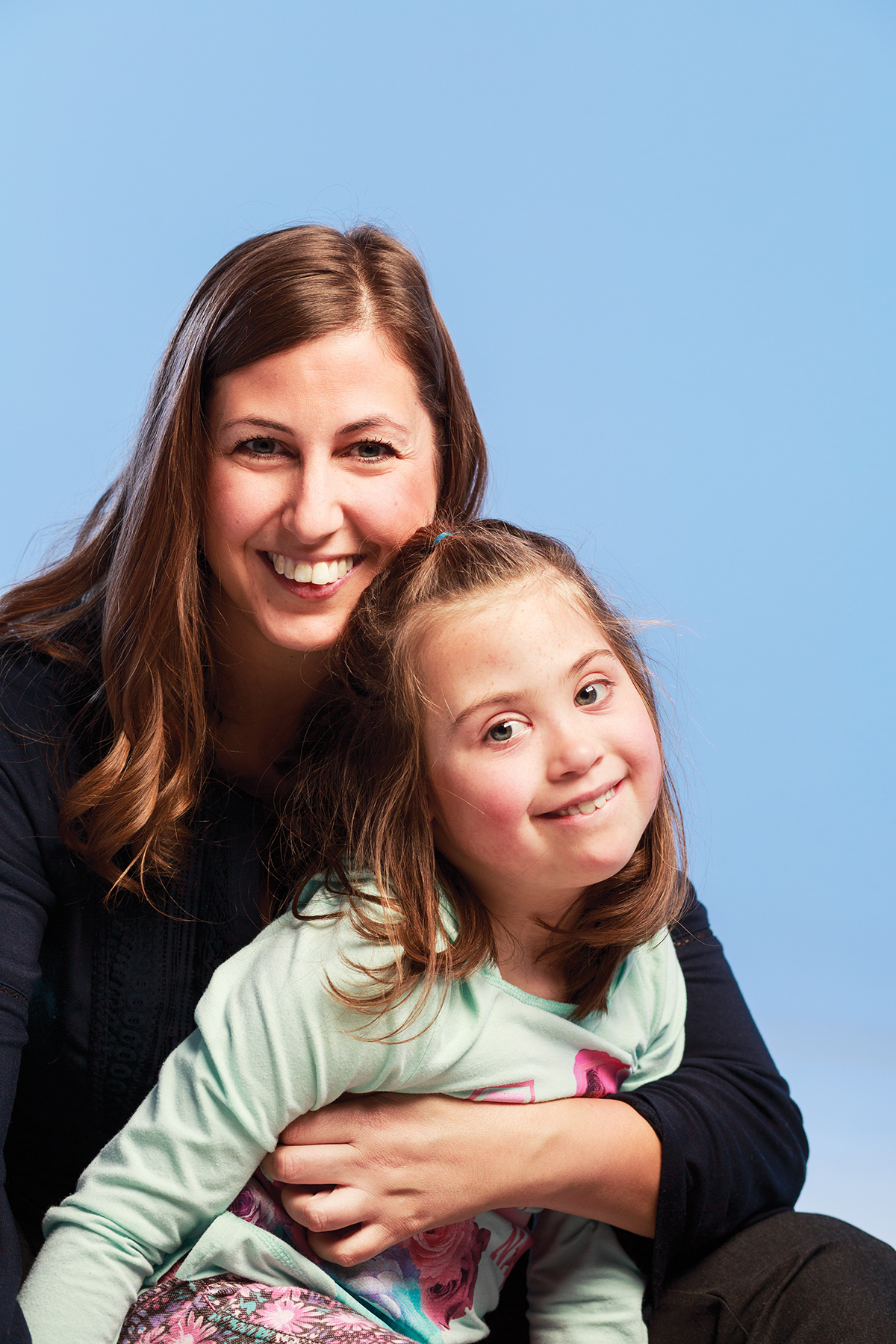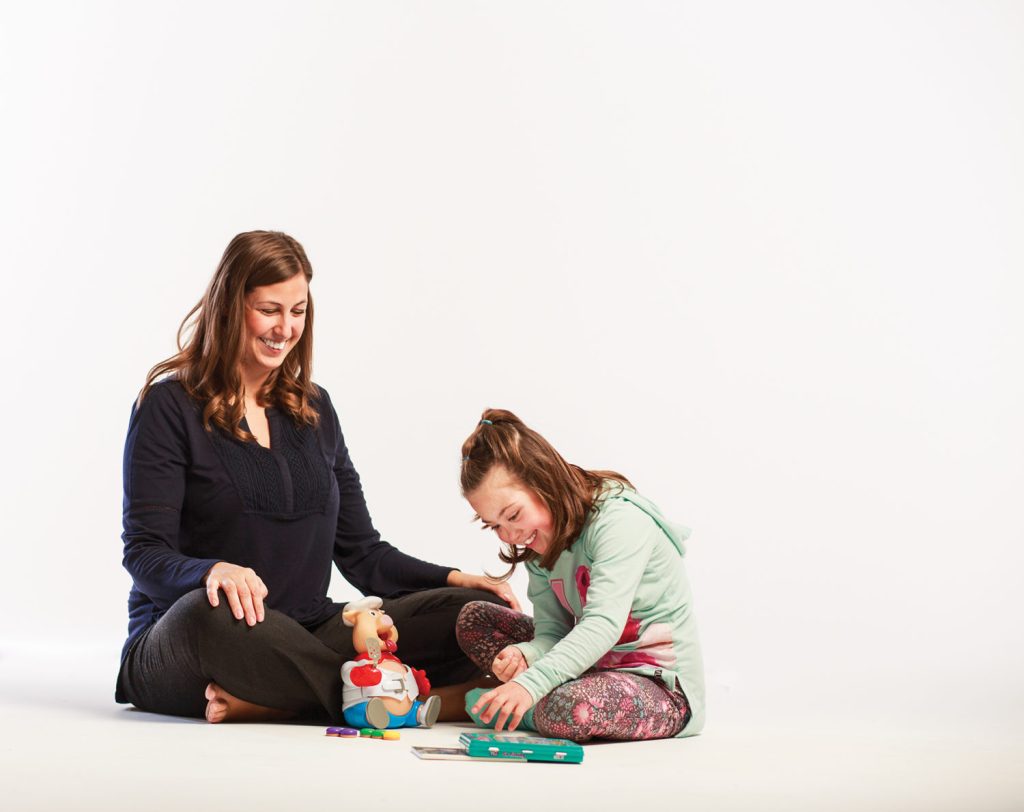Danielle Barnes was getting ready to put her daughter Mia into Grade 1, but every time she thought about it, her hands shook. She was a teacher herself, but the idea of sending her own child to school was scary because she knew Mia would require more support than many of the children she taught. Mia has Down syndrome and while Barnes knew there were many ways to facilitate her daughter’s learning, she didn’t know how they would work in a classroom.
Barnes went to a workshop held by the Edmonton Down Syndrome Society (EDSS), and that’s when things clicked. She learned how to envision what interactions would work best for her child. “I wrote what I wanted for her, and gave it to her teacher. It was powerful, because her first teacher didn’t know how to do this either. But if I hadn’t had that first piece, I wouldn’t have known where to start,” says Barnes.
Her plan involved having the school see Mia’s abilities, having children include her in their day, and having an adapted curriculum suitable for her learning style. Now, at eight years old, Mia is thriving at school, interacting with children of all skill levels. We want to really address what our community needs and wants and not just be told what we need by someone sitting behind a desk
Since that time, the EDSS continues to be a support to the Barnes family, as it is for many families from Red Deer north, to the Territories. Established in 1988 by Edmonton parents, the organization has grown from a very small playgroup with just four families to a non-profit that provides support in all areas of life-from health to education to socializing-from infancy to adulthood. EDSS is run by a governance board of community members along with a steering committee made up of parent volunteers who represent each age group.
Barnes is presently the co-chair of the steering committee and also sits on the governance board. Parent involvement is encouraged in the organization with opportunities to share information, ideas, and to help fundraise for the cause. “We want to be a parent-guided organization. We want to really address what our community needs and wants and not just be told what we need by someone sitting behind a desk,” Barnes says.
As a result, there are social groups for parents, children and adults, musical theatre groups, arts programs, a bowling league, speech pathology classes, and yearly fundraisers. The organization was even able to help put two health clinics into place for children and adults with Down syndrome.
In 2007, the EDSS funded a pilot project to develop a clinic for kids with Down syndrome at the Stollery Children’s Hospital, which involved hiring a full-time nurse for two years. The pilot was so successful it resulted in full, permanent funding through Alberta Health Services and now helps more than 400 children. Then, in 2015, the EDSS and The Down Syndrome Clinic formed a partnership with the Oliver Primary Care Network to create an adult medical clinic with the goal of expanding throughout the city.

These clinics are incredibly important, says Rosalind Mosychuk, chair of the EDSS steering committee, due to health challenges faced by those with Down syndrome. Heart defects, respiratory infections, thyroid disorders, and hearing and vision issues are more common among those with Down syndrome; therefore, having specialists who understand the population is better both for the patients and the health care system.
Mia, and her brother, Aiden, who also has Down syndrome, are both patients at the pediatric Down syndrome clinic. “The staff are really on top of their game, and you don’t have to worry about whether they’re being thorough because this is their expertise. And they can also connect you with other things in the community; so they can help you access other supports and refer you to programs,” says Barnes.
In fact, the amount of community information requested started to become overwhelming. Meanwhile, many people would call the EDSS office also asking for information, so it became evident that more community support was necessary. With a grant from Edmonton Community Foundation (ECF), EDSS created a family support liaison position two years ago. That position was filled by Julie Boucher, who helps connect families with assistance of all kinds, whether education, health or social.
“There was also funding coming from other supports, so it was a sense of us being part of the puzzle and helping leverage those other funds for a much needed service,” says Craig Stumpf-Allen, director of grants and community engagement for ECF. “They had support letters from other organizational partners and parents of those with Down syndrome expressing the importance of the support.” ECF also operates a designated fund for the EDSS, which was started by a family in support of the organization. Every year, the society receives money from the fund that can be used at its discretion.
Arden Playford says wading through piles of information, paper work, and various resources available for parents is incredibly challenging, even overwhelming. He knows first-hand as his 28-year-old son, Tyler, has Down syndrome. Tyler is very involved with the EDSS-he participates in many social gatherings, is part of a musical theatre group, and acts as an ambassador at various events around the city. The whole family has been involved with the organization since Tyler was seven years old. Both Playford and his wife, Jackie, were chairs of the board and remain very involved with fundraising events.
The addition of the family support liaison to the team, says Playford, has already made a difference for his family. Recently, the couple wanted to find a respite facility so that when they go away on holidays, they can rest easy, knowing their son will be looked after.
Government supports are available through Persons with Developmental Disabilities (PDD), but going through PDD had not yielded results. However, thanks to EDSS’s family support liaison, Boucher was able to find three potential places within 48 hours, including one within walking distance of the Playford’s home.
Our children are a very important part of the make-up of any community
There are now more than 80 parents who have asked for support, says Boucher, pointing to her filing cabinet full of information she has collected for the families. She sees her job as connecting people with the information they need, rather than doing the work for them. She provides them with choices and they can make the best one for their family. Recently, she helped a single mother who was struggling because she didn’t have a place for her three-year-old to go after playschool. While working and going to school, the mother really needed help and Boucher found several daycare options near the playschool. Meanwhile, she also connected a rural family with an aide who could communicate with their young child in sign language, something the school had not been able to do. She also got the child into the community hospital for free speech therapy. Another family had a five-year-old who wasn’t able to talk or walk. After connecting the family with the right resources, their son quickly became more mobile and vocal.
As their children grow, different supports are needed, and the organization is set up so it can cater to each stage. The EDSS provided support for Playford’s son, Tyler, as he enrolled in Concordia University, taking a Bachelor of Arts with a drama minor. Tyler is a natural performer who often dances to Michael Jackson’s Thriller at relatives’ weddings; he also held a small role in an episode of the locally filmed TV series Fear Itself in 2008.
“There was 100 per cent support when he went to university-he was assigned to a worker who has an office at the university and every morning, he’d report to her and she’d take him to class. She found a coach student to work with him, and they helped modify the curriculum,” says Playford.
When Mosychuk gave birth to her daughter 37 years ago, few medical professionals-never mind the general public-were well versed in Down syndrome. The medical books had maybe one line devoted to it, and it might have been mentioned briefly in a genetics class at university, she says. As a result, doctors did not even realize the potential of people with the condition.
While she had a very positive experience with her daughter, others faced many challenges. But now, she feels excited by the breadth of resources available and an ever-increasing ability to access them. Her own daughter, Tanya Ponich, is an advocate for those with Down syndrome-she’s been a Global Woman of Vision, is very involved with the Canadian and American Down Syndrome Societies, helps organize conferences, and gives motivational speeches across North America.
“It’s so wonderful for our children that things are changing; there is more information, more awareness. Our children are a very important part of the make-up of any community and they give back so much more than many people realize,” Mosychuk says.
